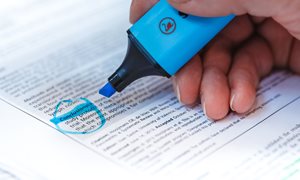Keeping on track
Training and supervision


Keeping on track
You have probably realized that time passes surprisingly quickly when doing your PhD. We recommend that you think about your progress and objectives for the coming year. This will help you keep on track.
read moreKeeping on track
Important questions
- Is your PhD progressing as you had expected?
- How would you assess the interaction and communication between yourself and your (co)supervisor(s)?
In light of these two questions, the following example points may be raised
- Reflection on expectations from the PhD project and from the supervisor(s)
- Reflection on end-of-year assessment [jaargesprek] with supervisor
- Reflection on personal ambition & interests
- Combination work and personal life
- Future career plans
- Reflection on achievements in last year
- Reflection on personal strengths and weaknesses (knowledge gaps, specific interests)
- Elective courses and workshops followed to date. Outcome & relevance e.g. in the light of improving weaknesses, technical expertise, future plans etc
- Reflection on Timeline for writing thesis: thesis chapter ideas > chapter titles > start writing.
- Foreseen difficulties
These topics can be discussed during the annual checkpoint meetings that are planned in Hora Finita.

Scientific Integrity: guidelines for publication and authorship
The 'Guidelines for publication and authorship' set the standard for the eligibility for authorship, and determine which order of authorship is the most appropriate. In his/her department, the head of department is responsible for creating a climate in which authorship and order of authorship comply with the basic principles of these guidelines.See the full text of the document here.
Please pay attention to the fact that you cannot be member of a Doctoral Thesis Committee if you are co-author of an article that is part of the thesis of this PhD candidate
Hora Finita
Go/maybe/no go meeting
To safeguard a successful PhD, we strive for an objective, clear evaluation and a guarantee that PhD candidates receive timely guidance to complete their PhD trajectory within the specified time. In this regard, the formal evaluation meeting at Checkpoint 2 is an important decision point.
read moreGo/maybe/no go meeting
To safeguard a successful PhD, we strive for an objective, clear evaluation and a guarantee that PhD candidates receive timely guidance to complete their PhD trajectory within the specified time.
-
With regard to safeguard a successful PhD, the formal evaluation meeting (with the entire supervision team and an independent advisor!) at Checkpoint 2 is an important decision point: with a positive evaluation both sides express confidence that the PhD trajectory will be completed successfully
- In case of weaknesses timely additional supervision will be provided via an intensified supervision trajectory
- A timely negative evaluation prevents PhD candidates from wasting time and prevents unnecessary project money from being spent.
The evaluation procedure is described in the "Regulations for training and supervision of PhD candidates at Radboud university medical center (versie 1)" and the accompanying "Procedure for the evaluation of PhD candidates (versie 1)”.
Please make sure to have the evaluation meeting completed 12 months after the start of the contract.
-
Go
The supervision team expresses confidence in the PhD candidate. The expectation of the supervision team is that the PhD trajectory can be successfully completed in a timely manner. It is important that the 'go' decision is mutual, i.e. that the PhD candidate also evaluates the PhD trajectory and decides to continue with a 'go'.
Maybe
There is doubt about whether the PhD candidate is able to successfully complete the PhD trajectory in a timely manner. In the event of a 'maybe', an intensified supervision trajectory is started. You can read more about this in the “Procedure for the evaluation of PhD candidates (versie 1)”. A new Checkpoint “Result Intensified supervision trajectory” will be scheduled.
No go
The supervision team is of the opinion that the PhD candidate is not sufficiently capable and/or the PhD trajectory cannot be completed successfully (in a timely manner). A 'no go' can only be issued after an intensified supervision trajectory has been completed, which has not led to the desired improvement. An intensified supervision trajectory lasts a minimum of 4 months and a maximum of 9. In the event of a 'no go', an intensified supervision trajectory must be started no later than in month 8. In other cases, the outcome at 12 months will be 'maybe'.
-
- Is an experienced researcher with a PhD degree;
- Is neutral to the project, but works on a similar research topic;
- Has no role in the research project and is not part of the research group(s) of PhD and supervisors;
- May also work outside Radboudumc;
- Will also join the Checkpoint 3 meeting;
- Can be part of the manuscript committee at a later stage (provided it is in agreement with RU policy);
- Is another person than the mentor of the PhD candidate.
-
- The PhD candidate proposes a potential independent advisor
- The PhD candidate together with the supervision team make a decision who will be the independent advisor
- The PhD candidate is responsible for approaching the independent advisor and for scheduling the evaluation moment
- The PhD candidate, the supervision team and the independent advisor will schedule a meeting no later than 12 months after the start of the PhD project
- Prior to the evaluation, checkpoint 2 is pre-filled in by the PhD candidate
- The PhD candidate starts with a presentation of the original Training and Supervision Plan (TSP), gives an update on the progress of the project (incl. potential bottlenecks and problems), and suggests future steps (~ 20 min.). This presentation can be open to other people, e.g., group members.
- After the questions based on the presentation, all other people leave the room. Together with the PhD candidate, supervision team and the independent advisor the presentation is followed by a discussion about the project and the progress thereof.
- Supervision team leaves room: PhD candidate can freely speak about potential problems about the project or the supervision with the independent advisor. The PhD candidate proposes whether they would like to continue with the PhD project.
- PhD candidate leaves room: Supervision team shares with the independent advisor their opinion on the progress of the project and potential problems that they foresee. The supervision team discusses whether the PhD progress is satisfactory and proposes a continuation of the PhD project, the start of an intensified supervision trajectory, or a discontinuation of the PhD project in case of an unsatisfactory outcome of an intensified supervision trajectory that already started in month 8.
-
- The group comes back together and discusses the opinions regarding the continuation and potential problems concerning the progress of the project and/or supervision (the latter only if PhD candidate agrees). The checkpoint form is used as a guideline for the discussion. A decision for a GO, MAYBE or a NO GO will be discussed. If there is no consensus between the supervision team and the independent advisor the director of the Graduate School will be informed.
- After the evaluation procedure:
- PhD candidate updates the checkpoint form and submits the checkpoint form in Hora Finita.
- In case of a MAYBE or a NO GO the HR advisor and the Graduate School coordinator (contact) will be informed by the PhD supervisor.
- In case of a MAYBE the HR advisor will be involved in the intensified supervision trajectory.
FAQ about Hora Finita
Questions? Please check out the answers to frequently asked questions first.
read moreFAQ about Hora Finita
For additional questions about Hora Finita, please contact Hora Finita or your Graduate School (Radboudumc Graduate School or Donders Graduate School).
This FAQ is divided into the topics 'General', 'PhD Checklist', 'Checkpoints', 'Training activities (portfolio)' and 'Manuscript'.
-
What is Hora Finita?
Hora Finita is the PhD project monitoring system of Radboud University and Radboudumc. With Hora Finita Radboud University and Radboudumc have an all-in-one system for the monitoring of all PhD projects. More information can be found on this page of the Radboud University's website.What is the link to Hora Finita?
The URL is https://horafinita.ru.nlIs registration in Hora Finita necessary?
For all PhD trajectories Hora Finita must be used, according to the Doctorate regulations. This is because all steps in the PhD process, e.g. registration, Training and Supervision Plan (TSP), submission and review of manuscript, are performed exclusively through Hora Finita. Logging in into Hora Finita is done via SURFconext and is only possible with a Radboudumc (or RU) account.Why can't I login into Hora Finita?
Logging in into Hora Finita is done via SURFconext and is only possible with a Radboudumc (or RU) account.Therefore it is important that all PhD candidates (employed PhD candidates, employees in PhD track, external PhD candidates) are registered with HR in time. More information about registration of different types of PhD candidates can be found here.
If the PhD trajectory is not completed within the contract period, action should be taken so that access to Hora Finita and associated Radboudumc facilities remains possible. More information can be found here.
If you are unable to login, even though you have a Radboudumc account, please contact horafinita@radboudumc.nl.
Where can I find Hora Finita manuals?
There is an extensive set of manuals available in Dutch and in English for both PhD candidates and supervisors.For additional questions about Hora Finita, please contact Hora Finita or your Graduate School (Radboudumc Graduate School or Donders Graduate School).
-
How can I agree to the Code of Conduct for Research Integrity?
If you click on the link behind the "Code of Conduct for Research Integrity" in the checklist you can read the code (ENG, Dutch) and check that you agree.I attended all required courses but the “required courses” are not ticked off in the PhD checklist on my dashboard
The Graduate School will add the two introduction courses (General introduction for research personnel and PhD introduction) to your training portfolio. You must add all other activities, including the required courses, to your portfolio yourself. You can do this for required courses through the tab "required courses". For all activities this can be done via "training activities". For more information please check the manual (ENG, Dutch).“Required course are completed” on your PhD checklist will only be ticked off when you select these courses via the tab “required courses”, or select these courses from the course list that is already available in Hora Finita. If you added a required course and its details yourself, please delete the course and add it again via the above mentioned procedure.
My TSP has been approved before but “TSP has been approved” is not ticked off or the date is not correct
Please contact your Graduate School (Radboudumc Graduate School or Donders Graduate School). -
What are checkpoints and where can I find more information?
Checkpoints are moments of supervision used to monitor and evaluate the progress of a PhD candidate's PhD project during the research phase.For more information about the checkpoints please check the interactive infographic of the Radboudumc PhD trajectory on our website. More information about the PhD trajectory of the Donders Graduate School can be found here.
Six weeks before the checkpoint date you will receive an automatic email announcing the checkpoint. In this email and on the checkpoint page is described what is expected of you.
When is a checkpoint created?
After the PhD candidate’s registration has been approved, Hora Finita automatically creates checkpoints. A new checkpoint will appear on your dashboard 6 months before the checkpoint date. Six weeks before the checkpoint date (exception: 3 months before checkpoint 2) you will receive an automatic email announcing the checkpoint. Checkpoints are automatically created until the first promotor approves the manuscript.Is a checkpoint meeting the same as my annual appraisal interview ("jaargesprek")?
The checkpoint (annual review) meeting is different from your annual appraisal interview, but you may choose to combine the two. In that case, please cover both the topics of the Hora Finita annual review questionnaire and the topics of the Radboudumc annual appraisal interview. Afterwards you have to submit both the annual review questionnaire (via Hora Finita) and the report of the annual appraisal interview (via email to "Postbus Personeelsdossier").Please note that for Checkpoint 2 (the go/maybe/no go meeting) and 3 (1 and 2 years after start PhD trajectory) an independent advisor is present at the checkpoint meeting.
Who should approve a checkpoint in Hora Finita?
Checkpoints 2 (go/maybe/no go) should be approved by the first promotor and the daily supervisor of the PhD candidate. The other checkpoints should only be approved by the daily supervisor. After the PhD candidate submits the Checkpoint, the daily supervisor automatically receives a request to approve the Checkpoint.The Training and Supervision Plan (TSP) should be approved by the daily supervisor, the promotor and the Graduate School.
-
How and when do I add activities to my PhD portfolio?
The Graduate School will add the two introduction courses (General introduction for research personnel and PhD introduction) to your training portfolio. You must add all other activities, including the required courses, to your portfolio yourself. You can do this for required courses through the tab "required courses". For all activities this can be done via "training activities". For more information please check the manual (ENG, NL).Annually, if you have a checkpoint, you will be asked to add the activities you did during the past year to your training activities (portfolio) in Hora Finita. Of course, you can also add an activity immediately after you've completed it.
Please note that for PhD candidates affiliated to the Radboudumc Graduate School it is not necessary to upload proofs of attendance.
I attended a required course but the course is not present in my portfolio
The Graduate School will add the two introduction courses (General introduction for research personnel and PhD introduction) to your training portfolio. You must add all other activities, including the required courses, to your portfolio yourself. You can do this for required courses through the tab "required courses". For all activities this can be done via "training activities". For more information please check the manual (ENG, NL).Please note that for PhD candidates affiliated to the Radboudumc Graduate School it is not necessary to upload proofs of attendance.
When do I have to complete my portfolio and submit it to my Graduate School for approval?
After your manuscript has been approved by your first promotor you will receive a request to complete your portfolio and submit it to your Graduate School for approval.Please note that for PhD candidates affiliated to the Radboudumc Graduate School it is not necessary to upload proofs of attendance.
Your Graduate School will decide whether you have completed all the necessary components of your institute’s PhD program in order to be awarded with your Graduate School’s education certificate. You will be informed of this decision in due course. The Graduate School will also provide you with a Word document of your final portfolio, which can be added to your PhD thesis.
-
How do I, as supervisor, perform a plagiarism check?
Indeed, according to the Doctorate regulations, the supervisor must check the PhD thesis for plagiarism. For this purpose, a similarity report, generated by the program iThenticate by colleagues at Radboud University, will be sent to the promotor via e-mail. Questions about the working method or the program can be sent to Hora Finita or the RU helpdesk. Together with the report, the promotor receives a manual, explaining how to use the program.
Courses for competencies
Core competencies for PhD candidates and postdocs
Radboudumc has defined a set of core competencies for PhD and postdoc candidates as a guideline for professional career development.
read moreCore competencies for PhD candidates and postdocs
During their training, PhD and postdoc candidates are expected to become independent researchers skilled in (financial) project management, policy/decision making and management. These types of transferable skills stand candidates in good stead not just for an academic career but also for the professional job market beyond the university setting.
Self-assessment tool
Collectively the university medical centres designed a competence model as a self-assessment tool to help you further develop yourself, and to recognize acquired competences.
PhD Compentence Model: Link
Types of core competencies
- Research skills and knowledge
- Responsible conduct of science
- Personal effectiveness
- Professional development
- Leadership and management
- Communication
- Teaching
- Radboud specific
For each type of compencies we offer a number of courses if you feel that you use some extra training to enhance these skills.
Scientific integrity
Contact persons
Radboudumc has appointed three experienced scientists, as contact persons in the case of suspicion of scientific misconduct or related matters.
Mentor
PhD mentor
The mentor is appointed at Radboudumc, has ample experience in PhD supervision and is an assistant, associate or full professor or a medical specialist with research experience. The mentor should not work in the same department as the PhD candidate and the supervisors and is not involved in the PhD project.
A quick guide for mentors
Mentors support PhD candidates in scientific reflection and career planning and are available for help with challenges. Confidentiality will be maintained at all times.
read more